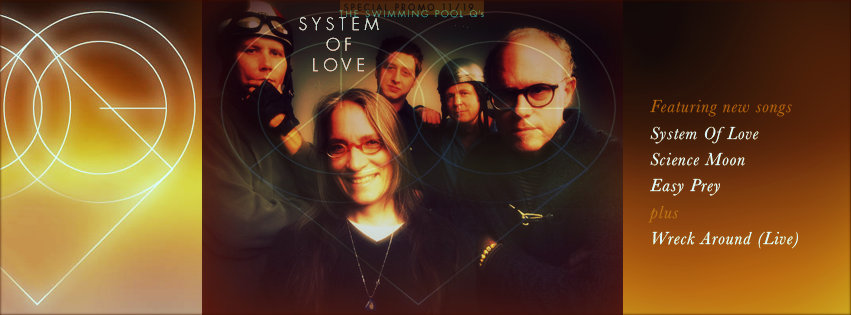System of Love EP by The Swimming Pool Q's- MP3 Album
Don’t believe a word of it: Two months on the road with Lou Reed
by Jeff Calder
NOVEMBER 1, 2013
Original link to article for The Vinyl District
Jeff Calder is a member of The Swimming Pool Q’s who have recently released The A&M Years: 1984-1986 (Cipher Bureau/ Bar-None)
“In fall 1984, The Swimming Pool Q’s toured America and Canada with Lou Reed. His comeback New Sensations had appeared the prior spring; “I Love You, Suzanne” was on MTV and in the charts. The Q’s first major label release on A&M Records, The Swimming Pool Q’s, arrived in August. In the short version of events, Lou dug our album, and when summoned by the poet to be his opening act, there was no internal dithering. Within a few days, we found ourselves in the warm-up slot at Stony Brook University on Long Island.
I’m not sure why Lou liked The Q’s. In comparison with the Downtown rock scene that the Velvet Underground had advanced by almost a decade, we were a little flowery and a lot Georgian, which he may have found refreshing. Also, Lou was really getting into his guitar and Mesa Boogie amps, so perhaps he liked something about the group’s twin six-string arrangements. Maybe our singer Anne Richmond Boston reminded him of Nico, who can say?
After the glamorous melodrama of the Sixties and the self-induced insanity of the Seventies, he was making a titanic effort to get his life back on track. I think he was in AA and NA–all the A’s–and alcohol and drugs were strictly forbidden backstage. In our infrequent encounters, he was a quiet, gentle person, like someone who had been through a great crisis and was keeping his own counsel. I think he appreciated that we didn’t bombard him with questions about the bad old days, not that we didn’t make every effort to create an opening. (When he spotted one of us backstage carrying a Velvet’s biography, he grinned and said, “Don’t believe a word of it.”)
Lou had a great band, anchored by the bassist Fernando Saunders; whenever the proper key would present itself, Fernando dropped his low string a whole step to make the rickety balconies quake in time, carrying the night with his punchy groove. Lou could be tough on his drummer Lenny, and it was only then that we caught a glimpse of the man’s legendary de Sade-ian side.
And there was Robert Quine, the brilliant abstract guitarist with whom Lou had a complex relationship, something like Hubert Sumlin’s tempestuous bond with Howlin’ Wolf. The impish Quine always relished fuming about this or that perceived affront. At Albany, he sauntered over to the mixing desk, where we were enjoying the show, and muttered a strong insult for our benefit about his employer, before launching a volley of sonic confusion that turned out to be the “solo” on “Satellite of Love.” It was a very professional touring organization, but the artist who created Metal Machine Music knew well he needed the uncertainty that Bob Quine brought to these proceedings.
On rare occasions, Lou would catch our act from the wings. At the Orpheum in Boston, for the only time on the tour, we decided to play one of our earliest songs, “Rat Bait,” which had a saxophone break. He caught us as we tumbled off stage and said, in his flawless Jerry Lewis whine, “Hey, I like that new thing you did with the horn!” It wasn’t everyday you received such a high-spirited compliment from the Master.
Lou was an unlikely icon for the Middle American rock crowds, but the fans loved him, particularly in towns like Chicago, Gary, Minneapolis, and Detroit. Stage center, wound up in a tight coil, he’d sometimes engage the audience in a deadpan sarcastic aside—he could still turn on the “old Lou” when he felt like it—and they loved him all the more for it. Usually, they were polite during The Swimming Pool Q’s’ set, though sometimes, like in Boulder, a muted chant would swell (“Looooou”), which could easily be mistaken for “Booooo,” but we got used to it, and it certainly would give us something to talk about 30 years later.
For two months, the tour carried us across the nation and back. Even in the 80s, it seemed like a strange unsettled place, a country so vast and unmanageable that breaking through, even with the luck of the angels, was a prospect beyond all comprehension. We touched down at the Universal Amphitheatre in Hollywood; San Francisco on Halloween; Toronto (a clandestine situation in which, over some obscure work permit issue, we had to smuggle our gear into the country on Lou’s equipment truck.)
There were three nights at the Beacon Theater in NYC and, heading south, a quick stop at Duke University. Most of the venues were 1930s movie palaces with Moorish themes, like Atlanta’s Fox Theater, where we finally landed back home the week before Thanksgiving. At the Great One’s request, we jammed en masse under the blue starry dome on “Sweet Jane,” captured in this photo by Jeff Slate.
Later that evening, at a local restaurant, he extended his generosity further, asking us sotto voce if we’d like to tour Europe with him in December. We desperately wanted to make it work; ultimately, due to impecuniosity, we couldn’t make it happen, so that was that. But what an honor to say now that Lou Reed gave The Swimming Pool Q’s the opportunity to see America in its totality. Could there have been a better steward than this silent hip Virgil?”
—Jeff Calder






